
| Acknowledgments | p. xi |
| Introduction: The Clash of Arab Civilizations | p. 1 |
| The Strong Horse: Tribes | p. 17 |
| "An Arab Regardless of His Own Wishes": The Idols of Arab Nationalism | p. 28 |
| "No Voice Louder Than the Cry of Battle": Arab Nationalism and Anti-Americanism | p. 44 |
| The Muslim Reformation | p. 63 |
| "The Regime Made Us Violent": The Islamists' War Against the Muslims | p. 82 |
| Bin Laden, the Father of Arab Democracy | p. 103 |
| The Schizophrenic Gulf | p. 121 |
| The Battle of Ideas: The Conqueror of Darkness and the Arab Voltaires | p. 141 |
| "Your Children or Your Guns": The Cedar Revolution and the Fight for the Future of Lebanon | p. 161 |
| The Capital of Arab Resistance: Damascus's Regime of Terror | p. 183 |
| Middle East Cold War and the Israeli Strong Horse | p. 201 |
| Conclusion | p. 217 |
| Notes | p. 225 |
| Index | p. 231 |
| Table of Contents provided by Ingram. All Rights Reserved. |
The New copy of this book will include any supplemental materials advertised. Please check the title of the book to determine if it should include any access cards, study guides, lab manuals, CDs, etc.
The Used, Rental and eBook copies of this book are not guaranteed to include any supplemental materials. Typically, only the book itself is included. This is true even if the title states it includes any access cards, study guides, lab manuals, CDs, etc.
Excerpted from The Strong Horse: Power, Politics, and the Clash of Arab Civilizations by Lee Smith
All rights reserved by the original copyright owners. Excerpts are provided for display purposes only and may not be reproduced, reprinted or distributed without the written permission of the publisher.